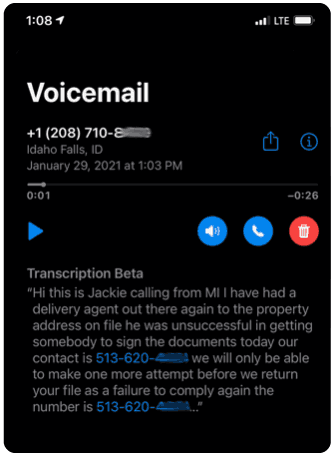
Share This!
Recently, someone asked me about a telephone voicemail message they received that concerned them. The call came from an unknown telephone number, so the call’s recipient didn’t answer it. The message the caller left in voicemail worried the recipient, and they asked me if it was a telephone scam.

The caller gave no information about themselves apart from an apparent abbreviation of their company’s name. The message was about a delivery agent being unsuccessful at reaching someone at “the property address” to sign documents. Failure to sign meant “failure to comply,” they said. The recipient felt that the wording used in the message implied delinquency, but they weren’t delinquent on bills, debts, or anything else, so they were confused and concerned about calling back.
Some common telephone scams
People running telephone scams like the one this person received may try to get important financial information from you. They may ask for your social security number by saying they need it to verify your information. If you tell them what it is, they WILL have it! Some attempt to get your credit card or bank account information by scaring you into it, saying you will be fined or arrested if you don’t pay them immediately.
The most common topic of the calls reported to the FTC’s DoNotCall.gov site in 2021 was imposters, including calls from scammers pretending to be the Social Security Administration or IRS.
Government agencies, such as the IRS or Social Security Administration, won’t call to confirm your sensitive information. Law enforcement and federal agencies won’t call to threaten you. Legitimate debt collectors must provide YOU with accurate information, not the other way around.
Telephone scams come in many forms, but many cheat people out of money or gather personal information to commit identity theft. Learning how to recognize phone scams and checking a phone number online can help protect you against them.
Have others experienced the call too?
There are online sites that can help you learn what others have reported when receiving a call from the same unrecognized phone number. The service on many of these sites is free, but you need to watch out for ads within them that direct you to paid services.
A quick search in Google or DuckDuckGo of the phone number from the voicemail message referenced above revealed that others had received the same call. Many reported that they knew it was a scam because they were always home or reviewed their security cameras, and no one attempted a delivery. One discovered a reference to an investigation about the caller. Another said that they returned the call only to discover the number was invalid.
Learn to recognize a telephone scam
Being informed ahead of time is essential, especially when calls like these catch us off guard. The Federal Trade Commission informs us on how to recognize a telephone scam and what to do if you receive such a call.
Methods to help stop unwanted calls
The FTC provides brief flyers and short YouTube videos to help you stop unwanted calls from reaching your phone, whether it’s a mobile, traditional landline, or an internet (VoIP) phone.
Hang up
Scammers will call you even if your phone number is on the Do Not Call Registry. Don’t trust people who call you unsolicited. Simply hang up.
If you get a robocall (a recorded message instead of a live person), don’t press any numbers. Pressing a number to reach a live operator or to remove you from their list might lead to more calls. Instead of pressing a number, simply hang up.
Don’t trust your Caller ID
Scammers use spoofing to make any name or number show up in your Caller ID. They often use neighbor spoofing to make their call appear like it’s coming from a local or regional number. Other times they will use a number from a company or government agency that you may know and trust.
If you answer a call and realize afterward that it could be a spoofed call, simply hang up.
Let calls go to voice mail
Consider letting unexpected calls or unknown callers go to voice mail. Real people will normally leave a voice mail message that you can understand. Voice mail left by a scammer or robocall oftentimes won’t make sense or the message will be cut off. If you wonder if the call is from a legitimate company or government agency, call the phone number listed on your account statement, in the phone book, or on the company’s or agency’s website. Talk to a person there to verify the credibility of the call.
Wait before saying hello
If you receive a lot of unsolicited phone calls every day, you can reduce them by waiting to say hello. When your phone rings, pick up the receiver to answer the call, but don’t say hello. Remain quiet. Wait about 15 seconds. If the call is unsolicited or a robocall, they usually hang up within that time. If you say hello after 15 seconds, normally you’ll find that the caller has already hung up, and you can safely end the call.
Suppose the caller is a real person. They will normally say hello during the 15 seconds because they hear nothing, not even ringing. At that point, say hello back and then pay attention to the conversation to determine if it’s legitimate. If you find that it’s a scammer or robocall, hang up.
By waiting to say hello, the phone system that unsolicited callers use tags your number as unresponsive, and it gets removed from their call list. You could see the number of unsolicited calls you receive drop to zero.
Take control—be informed
Phone scams come in many forms. They typically make similar promises or threats, request personal information, or ask you to pay in specific ways. Often, the caller will fake the name and number they call from to make you believe the call is legitimate. By being informed, you will know how to handle the next call.
Further Reading
Learn about protecting aging parents from spam text messages.

